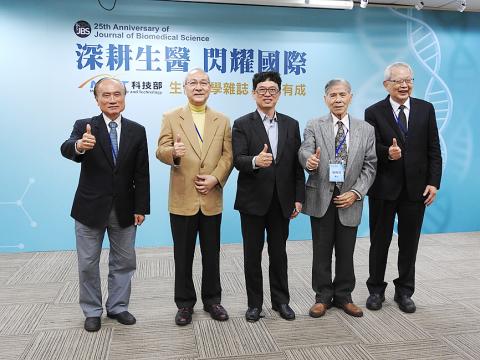Research and experimental medicine papers from Taiwan’s first English-language journal for biomedicine last year ranked as the most influential in Asia, the Ministry of Science and Technology said yesterday as the journal marks its 25th anniversary.
The ministry celebrated the anniversary of the Journal of Biomedical Science at a news conference in Taipei, which was attended by the journal’s current and former editors-in-chief.
The journal, launched by the ministry in January 1994, is the first international journal in biomedical science operated by a Taiwanese team, Deputy Minister of Science and Technology Shieh Dar-bin (謝達斌) said.

Photo courtesy of the Ministry of Science and Technology
Its impact factor, which reflects the yearly average number of citations its published articles received, rose from 0.99 in 1999 to 5.203 last year, Shieh said, citing information in the Journal Citation Reports (JCR) database released by the US Institute for Scientific Information earlier this year.
When the Journal of Biomedical Science first started publishing, only about three in every 100 submissions by Taiwanese researchers were accepted by international journals, said Chang Chuan-chiung (張傳炯), the journal’s founding editor-in-chief and Academia Sinica academician renowned for his research on snake venoms.
In research and experimental medicine, JCR ranked the Journal of Biomedical Science as No. 1 among 19 similar publications in Asia and 20th of 136 similar journals worldwide last year, said Chang Wen-chang (張文昌), its current editor-in-chief and chairman of Taipei Medical University’s board of trustees.
In cell biology, the journal was ranked fourth among 18 similar publications in Asia and 49th among 193 similar publications worldwide, he said, adding that the field is more competitive for studies involving both animal and plant cells.
The key to improving the Journal of Biomedical Science’s clout is to publish special issues on “trending topics” or subjects showcasing Taiwan’s research edge, such as enterovirus 71, dengue fever, hepatitis B, immunotherapy and neurodegenerative diseases, Chang Wen-chang said.
Over the past five years, the Journal of Biomedical Science had received 24 percent of submissions from China, 12 percent from India, 8 percent from Taiwan and 3 percent from the US, he said, adding that quality, not nationality, is the primary consideration for publication.
The journal is published by UK-based BioMed Central, part of global publisher Springer Nature, which helps it reach more readers in the US and Europe, he said.

The Ministry of Economic Affairs has fined Taobao NT$1.2 million (US$36,912) for advertisements that exceed its approved business scope, requiring the Chinese e-commerce platform to make corrections in the first half of this year or its license may be revoked. Lawmakers have called for stricter enforcement of Chinese e-commerce platforms and measures to prevent China from laundering its goods through Taiwan in response to US President Donald Trump’s heavy tariffs on China. The Legislative Yuan’s Finance Committee met today to discuss policies to prevent China from dumping goods in Taiwan, inviting government agencies to report. Democratic Progressive Party Legislator Kuo Kuo-wen (郭國文) said

The Ministry of Economic Affairs has fined Taobao NT$1.2 million (US$36,900) for advertisements that exceeded its approved business scope and ordered the Chinese e-commerce platform to make corrections in the first half of this year or its license would be revoked. Lawmakers have called for stricter supervision of Chinese e-commerce platforms and more stringent measures to prevent China from laundering its goods through Taiwan as US President Donald Trump’s administration cracks down on origin laundering. The legislature’s Finance Committee yesterday met to discuss policies to prevent China from dumping goods in Taiwan, inviting government agencies to report on the matter. Democratic Progressive Party

Taiwan and its Pacific ally Tuvalu on Tuesday signed two accords aimed at facilitating bilateral cooperation on labor affairs, according to Taiwan’s Ministry of Foreign Affairs (MOFA). The governments inked two agreements in Taipei, witnessed by Foreign Minister Lin Chia-lung (林佳龍) and visiting Deputy Tuvaluan Prime Minister Panapasi Nelesone, MOFA said in a news release. According to MOFA, the agreements will facilitate cooperation on labor issues and allow the two sides to mutually recognize seafarers’ certificates and related training. Taiwan would also continue to collaborate with Tuvalu across various fields to promote economic prosperity as well as the well-being of their

Sung Chien-liang (宋建樑), who led efforts to recall Democratic Progressive Party (DPP) Legislator Lee Kun-cheng (李坤城), was released on bail of NT$80,000 today amid outcry over his decision to wear a Nazi armband to questioning the night before. Sung arrived at the New Taipei District Prosecutors’ Office for questioning in a recall petition forgery case last night wearing a red armband bearing a swastika, carrying a copy of Adolf Hitler’s Mein Kampf and giving a Nazi salute. Sung left the building at 1:15am without the armband and covering the book with his coat. Lee said today that this is a serious